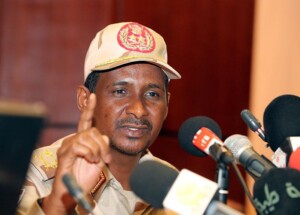Misseriya storm oil field in West Kordofan to demand border demarcations
Misseriya youth protesters involved in a border dispute with the local Hamar tribe stormed the Um Adara oil field in West Kordofan on Thursday, forcing the station to halt its activities and detaining the oil workers. The oil pipeline transporting oil from the station has also been closed down, which might cause severe technical issues and permanent damage.
 The 'Jake' oil fields in West Kordofan (Elzahra Jadallah)
The 'Jake' oil fields in West Kordofan (Elzahra Jadallah)
Misseriya youth protesters involved in a border dispute with the local Hamar tribe stormed the Um Adara oil field in West Kordofan on Thursday, forcing the station to halt its activities and detaining the oil workers. The oil pipeline transporting oil from the station has also been closed down, which might cause severe technical issues and permanent damage.
An assembly of oil workers said in a press statement that the PetroEnergy pipeline transporting oil from Um Adara station has been suspended since Friday evening, after protesters stormed the BV2 station and detained its workers last Thursday. Electricity supply was reportedly cut off from the field.
The light crude oil pipeline transports roughly 8 thousand barrels of oil per day from the Um Adara station in West Kordofan,
The workers’ assembly announced that stopping the work of the pipeline completely may cause severe technical issues and held the authority responsible for the complete halt of the line. They also considered the closure ‘a real threat’ to Sudan’s oil supply.
The Misseriya youth association announced new escalatory steps after closing the Um Adara oil field last Thursday.
Farah Mohamed Farah, head of the youth body to support Misseriya issues, told online news outlet Darfur24 that the association would declare a sit-in in the Um Adara area to demand the release Misseriya herdmen detained by the Sudan People’s Liberation Movement-North since April and the cancellation of the decision to halt the border demarcation process.
West Kordofan State is witnessing a border dispute between the Misseriya and Hamar tribes in the El Nehoud localities, which led to violence between the two tribes in Abu Zabad locality last month.
The youth association also explained that the regions in which the oil pipeline is located are underdeveloped and suffer from the absence of services. Locals also fear disease outbreaks and environmental disasters resulting from oil extraction and refining operations in the area.
Border conflict
Following a conflict concerning the demarcation of the border between the Hamar and Misseriya nomad tribes in the area, fighting broke out in Abu Zabad on September 11. The clashes that lasted until the next morning, left at least six people dead. More than 20 others were injured.
The African Centre for Justice and Peace Studies warned that the conflict could have serious negative impacts on the region, which might also impact South Kordofan. The conflicting parties signed a reconciliation agreement on September 21.
Recently, the Hamar held a series of protests to demand a new state of Central Kordofan.
Unilateral decisions
The problems between the two Arab nomad tribes started in July, when the West Kordofan Security Committee and Misseriya leaders formed a unilateral committee to demarcate the borders between El Sunut, dominated by Misseriya, and En Nehoud, mostly populated by Hamar, without notifying the latter.
Hamar Nazir Abdelgader Mansour told Radio Dabanga in August that the demarcation would almost certainly lead to the expropriation of large areas of land belonging to the Hamar, in favour of the Misseriya.
Despite Hamar requests to discuss the issue, the unilateral committee proceeded to redefine the borders. The Hamar then launched a number of protests in the state, including the closure of the En Nehoud-El Obeid road, and sent a delegation to Khartoum to bring the matter before the Sovereignty Council.
Sovereignty Council member Shamseldin El Kabbashi responded on August 31 by suspending the demarcation process. The Misseriya now demand the cancellation of this decision.











 and then
and then